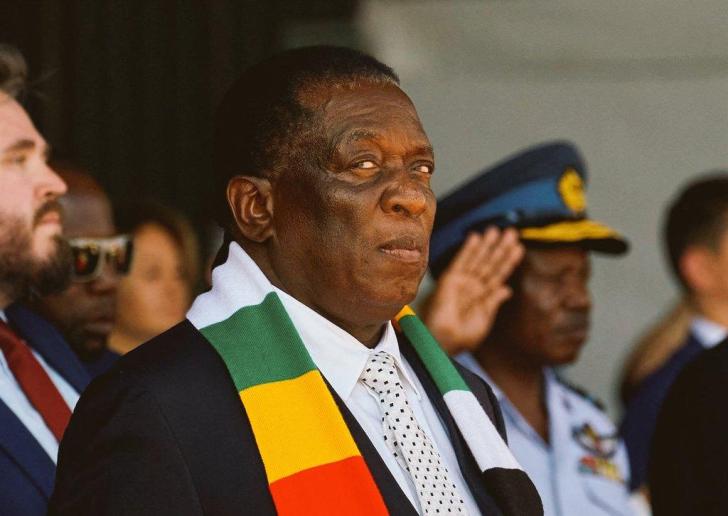News / National
Mnangagwa returns with battered image?
05 Feb 2025 at 12:11hrs |
0 Views

President Emmerson Mnangagwa has officially returned to active duty after his annual leave, but his comeback is marred by intense political and economic turbulence. While Mnangagwa was on leave, Vice President Constantino Chiwenga, backed by his military-aligned faction within Zanu-PF, led a harsh and relentless campaign against the President, ruthlessly tarnishing his image.
War veterans, who are also seen as a reserve force of the military, escalated their attacks on Mnangagwa during his absence, calling for his resignation over his controversial bid for a third term. The war veterans have accused the President of economic mismanagement, cronyism, nepotism, corruption, and incompetence - claims they argue have worsened the economic crisis and further impoverished the Zimbabwean people.
Mnangagwa's spokesman, George Charamba, who had remained largely silent amid the attacks, stated that the President's focus upon his return would be on the economy. "The President is now officially back from his leave, and as you may know, there have been certain economic developments in the past few weeks. He had to break his leave last week to chair a meeting that focused on the economic developments in the country. His major focus will be on the economy, and some major decisions will be made regarding the economy," Charamba told The Herald, the state-controlled newspaper.
However, Mnangagwa's return to work comes amid a worsening economic situation, with his image badly battered. Zimbabwe is grappling with an escalating crisis marked by widespread company closures, especially in the retail and wholesale sectors. Major retailers such as OK and N Richards have been forced to close some of their branches due to a challenging operational environment, signaling a deepening economic contraction.
The country is also grappling with severe currency distortions, inflation, and an expanding black market for foreign exchange, all of which continue to undermine efforts for economic stabilization. Government revenues are under strain as the tax base shrinks, and the informal economy, now comprising about 60% of the country's economic activity, exacerbates the fiscal challenges. The informal sector, while providing some livelihood for many, remains largely outside the control of authorities and contributes little to government revenue.
The government's response to these challenges has been a raft of new taxes, especially targeting the shrinking formal economy, and a crackdown on the informal sector, which is seen as a major obstacle to generating sufficient tax revenue. The informal economy, however, remains difficult to regulate and tax, posing long-term challenges to Zimbabwe's public finances and any hopes of economic recovery.
Mnangagwa, already under fire from his political adversaries within Zanu-PF, now faces the daunting task of regaining control of the economy while navigating the internal party divisions that threaten his leadership. As the country continues to face economic contraction, rising inflation, and a growing public outcry over government mismanagement, the President's ability to make decisive and effective economic reforms will be crucial to his political survival.
War veterans, who are also seen as a reserve force of the military, escalated their attacks on Mnangagwa during his absence, calling for his resignation over his controversial bid for a third term. The war veterans have accused the President of economic mismanagement, cronyism, nepotism, corruption, and incompetence - claims they argue have worsened the economic crisis and further impoverished the Zimbabwean people.
Mnangagwa's spokesman, George Charamba, who had remained largely silent amid the attacks, stated that the President's focus upon his return would be on the economy. "The President is now officially back from his leave, and as you may know, there have been certain economic developments in the past few weeks. He had to break his leave last week to chair a meeting that focused on the economic developments in the country. His major focus will be on the economy, and some major decisions will be made regarding the economy," Charamba told The Herald, the state-controlled newspaper.
The country is also grappling with severe currency distortions, inflation, and an expanding black market for foreign exchange, all of which continue to undermine efforts for economic stabilization. Government revenues are under strain as the tax base shrinks, and the informal economy, now comprising about 60% of the country's economic activity, exacerbates the fiscal challenges. The informal sector, while providing some livelihood for many, remains largely outside the control of authorities and contributes little to government revenue.
The government's response to these challenges has been a raft of new taxes, especially targeting the shrinking formal economy, and a crackdown on the informal sector, which is seen as a major obstacle to generating sufficient tax revenue. The informal economy, however, remains difficult to regulate and tax, posing long-term challenges to Zimbabwe's public finances and any hopes of economic recovery.
Mnangagwa, already under fire from his political adversaries within Zanu-PF, now faces the daunting task of regaining control of the economy while navigating the internal party divisions that threaten his leadership. As the country continues to face economic contraction, rising inflation, and a growing public outcry over government mismanagement, the President's ability to make decisive and effective economic reforms will be crucial to his political survival.
Source - online
Join the discussion
Loading comments…



























